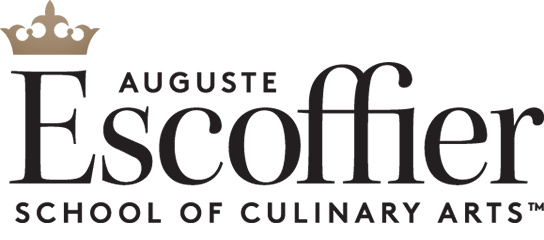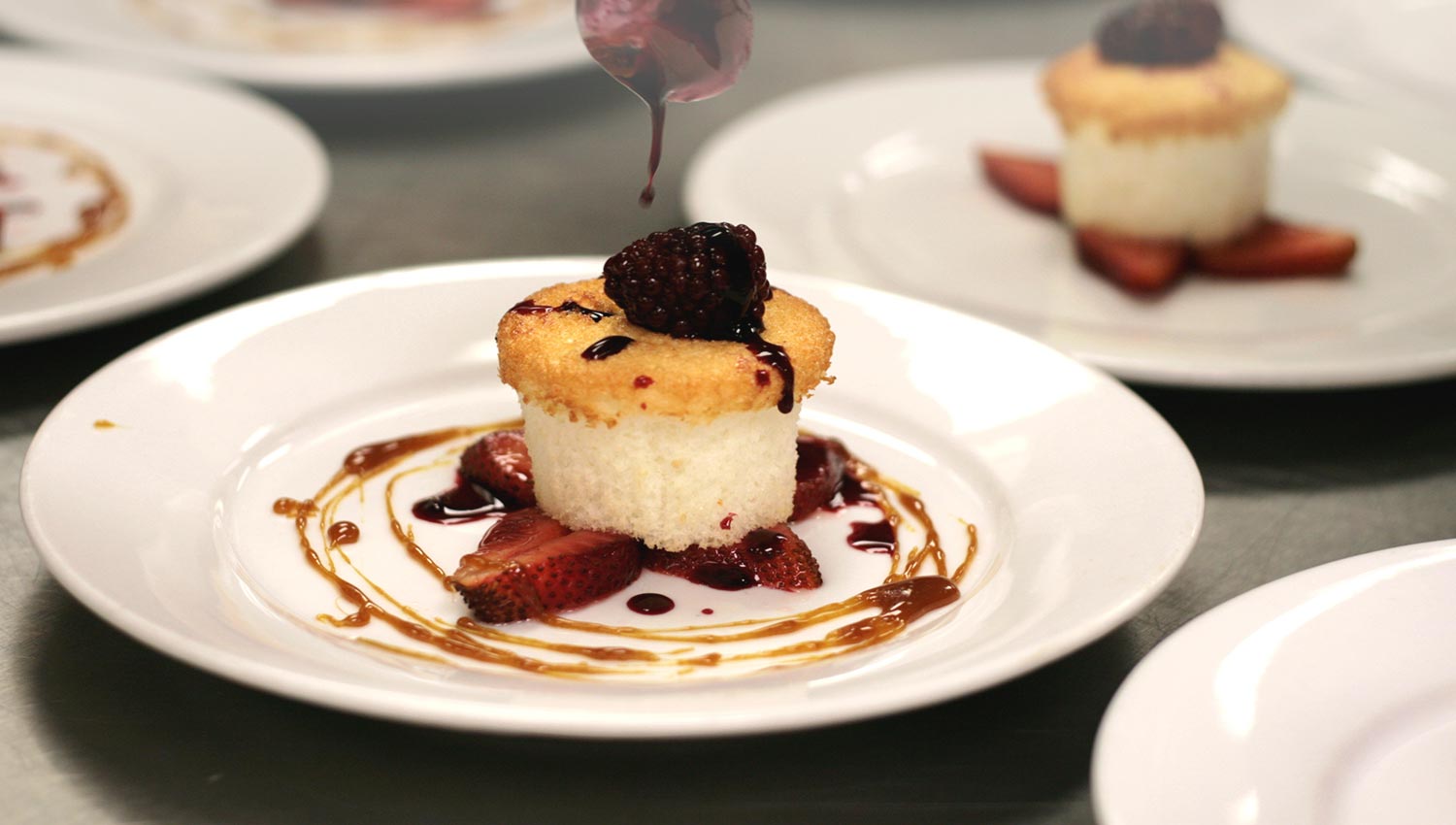
ASSOCIATE OF
OCCUPATIONAL STUDIES
Degree in Baking and Pastry
Steps To Success As An
meet escoffier chef-in-residence
Kristen Kish is the host of Top Chef and Escoffier’s new Chef-in-Residence. Chef Kish will help inspire Escoffier students through a special lecture class, exclusive content, and other engagement activities. About Kristen Kish
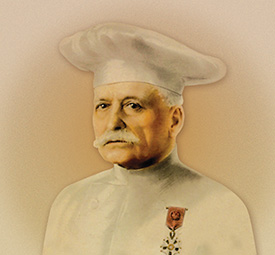
Did you Know?
Auguste Escoffier was known as the King of Chefs and the Chef of Kings!
His contributions to the culinary world include, but are not limited to: creating the menu, designing the five mother sauces, promoting farm-to-table cuisine, and instituting sanitation standards. His influence on cuisine is felt in kitchens across the world nearly a century later!
BEST COLLEGES FOR CULINARY ARTS
Ranked one of the Best Colleges for Culinary Arts in America in 2026 by Niche.com
*Based on comparable student population data for Austin and Boulder as currently reported in Integrated Postsecondary Education Data System (IPEDS).
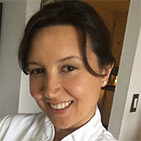
“The externship provided hands-on, real world experience. The skills I acquired led to tangible end results in the creation of professionally baked goods.”*
Maria Dzuzelewski, Baking and Pastry Arts Certificate Program
Your Goals, Your Passion, Your Future
Our Mission
To cultivate passion and lifetime careers in food, hospitality and health by offering affordable, accessible and socially minded education and opportunities to learn.
Accreditations & Associations
We are the only U.S. accredited institution offering 100% online degrees with culinary classes and hands-on industry externships!1
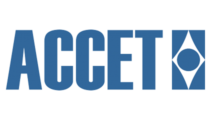
U.S. DEPARTMENT OF EDUCATION RECOGNIZED AGENCY
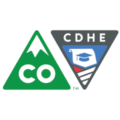
COLORADO DEPARTMENT OF HIGHER EDUCATION

NATIONAL COUNCIL FOR STATE AUTHORIZATION RECIPROCITY AGREEMENTS
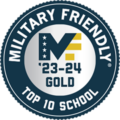
2023-2024 MILITARY FRIENDLY®️ SCHOOL
Our online programs are available through the Boulder campus. Auguste Escoffier School of Culinary Arts in Boulder, Colorado is nationally accredited by the Accrediting Council for Continuing Education and Training (ACCET).
It is also approved and regulated by the Colorado Department of Higher Education (CDHE), Division of Private Occupational Schools. Auguste Escoffier School of Culinary Arts (Boulder, CO) has been approved by CDHE to participate in the National Council for State Authorization Reciprocity Agreements (NC-SARA).

“The Escoffier Online education is a more accessible and affordable quality education available to a great many more people than the classic brick and mortar campus.”
Chef Jeremiah Tower, American Celebrity Chef & Father of California Cuisine
Curriculum
Multiple classes can occur during one 6-week session.
Fundamentals of Baking and Pastry
This course concentrates on food safety and sanitation in the professional kitchen. The importance of proper hygiene, food handling and storage, cleaning, pest control and HACCP in a food service operation is explored. The course includes baking and pastry mixing methods and ingredient identification. The framework to understand the principles of the following cooking and baking techniques are taught: classic pastry doughs, pate a choux, fried doughs, pies and tarts, baked custards and stove top custards, quick breads, scones, muffins, cookies, brownies and bars, as well as dessert sauces.
Menu Design and Management
This course explores different types of menus (including both food menus and beverage menus) and their applications. The course covers all aspects of menu planning and design, ranging from visual design to price analysis to making use of available resources. The menu is both a financial tool and a communication tool, and students learn about its uses as both.
Business and Professional Communications
This course emphasizes the principles and practical application of effective professional communication behaviors within professional, business, and organizational contexts. In addition to identifying the importance of effective communication skills to the hospitality industry, communication styles and effective listening methods are addressed. Listening skills, verbal and nonverbal communication, conflict resolution, cultural differences in communication, and debate techniques are also covered.
Patisserie
Patisserie introduces students to the skills and techniques needed to become a well-trained pasty professional, including instruction, examples and guidance in classic meringue, buttercreams, mixing, and piping. Cake decorating is a large focus and includes wedding cakes. Frozen desserts, fresh fruit and sugar cookery are addressed. Plating and baking production timelines are also examined.
Foodservice Math & Accounting
This course introduces students to managerial accounting and cost control concepts and explains their applications to specific operations within the hospitality industry including expenses, revenue, food, beverage, labor, and other controllable and non-controllable costs. Income statements and profit analysis are covered as well.
Food and Beverage Cost Control
This course gives students the skills to not only keep their restaurant in business but also turn a profit. This course introduces students to purchasing, receiving, inventory management and menu pricing. Students learn how to minimize costs and maintain a full range of customer services. The course progresses from the fundamentals of culinary math into an overview of storeroom operations, inventory, portion control, as purchased and edible portions, ingredient conversions, and recipe costing.
Confiserie and Artisan Baking
Artisan Bread provides the framework to understand the principles of the following methods and techniques: the methods of pre-fermentation, biga, and sponge, starting and maintaining a variety of sourdough starters, extended fermentation, the 10 steps of bread production, proper shaping, proofing and scoring, whole grain breads, Italian artisan breads, enriched breads, and special occasion/holiday breads, puff pastry and laminated dough. Students will study the proper techniques in buying, storing and melting chocolate, chocolate tempering, chocolate candies, truffles and pralines, nut based candies, cooked sugar based candies and sugar art showpiece design and execution, chocolate molding, chocolate finishing techniques, chocolate decorations, amenity design & execution, chocolate showpiece design and execution.
World History & Culture from the Culinary Perspective
Food has impacted societal organization, industrial development, military conflict, and economic expansion. As epicure and gastronome Jean-Anthelme Brillat-Savarin stated, “Gastronomy governs the whole of human man.” This course examines the role of food and its contribution and influence over history, culture, religion, economics, and politics.
Foodservice Management
This course covers the different types of commercial food service operations, and how to manage each using the principles of good service. Students study the hierarchy of management in food service, and the skills needed to succeed as a manager: training employees, motivating them, disciplining them, and creating a safe and positive work environment. The course also explores how to act responsibly and make decisions that benefit the company.
Technical Writing for the Hospitality Industry
This course prepares students to write in the hospitality and food service professions. In a professional setting, writing provides readers information they need in a format they can understand. This course outlines strategies for making subjects clear to readers who need to understand them. To communicate effectively with an audience, writing must meet rigorous editing standards, in addition to writing in a clear, concise style and presenting information logically.
Global and Contemporary Cuisine
This course highlights modern considerations in the baking industry. Trends in diets and eating habits are constantly changing, and being able to stay on top of them is a key industry skill. Students also learn about cutting-edge trends in dessert composition and contemporary plating techniques, and how to stay current with those. In addition, the course explores different regions’ desserts, as well as their cultural significance and the historical influences that produced them.
The Science of Nutrition
This course covers the basic principles of nutrition, emphasizing nutrients, food sources, and their role in growth, development, and overall health. Contemporary and global nutritional issues are also discussed.
Building Your Own Business
This course covers such topics as business planning, pricing, credit management, government regulation, legal concerns, and business ethics. Students learn how to manage and how to lead. For the final project for this course, the student will complete and present a business plan for a food service operation.
Pastry Industry Externship I
This course provides opportunities for real life experiences in an operational restaurant or related business and builds on the skills and techniques covered in previous courses. In the course, students apply the skills they’ve learned in practical ways to real-world situations. Students gain hands-on experience in the kitchen that mirrors their future work in the industry and develop the skills necessary for a culinary career. Immersion in a work environment also allows students to develop industry contacts and build working relationships.
Pastry Industry Externship II
This course provides opportunities for real life experiences in an operational restaurant or related business and builds on the skills and techniques covered in previous courses. In the course, students apply the skills they’ve learned in practical ways to real-world situations. Students gain hands-on experience in the kitchen that mirrors their future work in the industry and develop the skills necessary for a culinary career. Immersion in a work environment also allows students to develop industry contacts and build working relationships.
Students can first complete the Diploma in Professional Pastry Arts Program and then add the remaining course requirements to complete the Associate of Occupational Studies Degree in Baking and Pastry.
Intro
Completed Diploma in Professional Pastry Arts Program
*When a student completes the Diploma in Professional Pastry Arts online program prior to enrolling into the Associate Degree program.
Courses for Diploma in Pastry Arts Program consist of:
Fundamentals of Baking and Pastry I
Fundamentals of Baking and Pastry II
Menu Design and Management
Contemporary Pastry Arts
Global Pastry Arts
Food and Beverage Cost Control
Foundations of Bread I
Foundations of Bread II
Foodservice Management
Confiserie
Cake Design and Decorating
Building Your Own Business
Pastry Industry Externship I
Business and Professional Communications
This course emphasizes the principles and practical application of effective professional communication behaviors within professional, business, and organizational contexts.
World History and Culture from the Culinary Perspective
This course examines the role of food and its contribution and influence over history, culture, religion, economics, and politics.
The Science of Nutrition
The basic principles of nutrition are investigated. Emphasis is placed on the nutrients, food sources, and their utilization in the body for growth and health throughout life. Contemporary and global nutritional issues are also discussed.
Foodservice Math and Accounting
This course introduces students to managerial accounting concepts and explains their applications to specific operations within the hospitality industry.
Technical Writing for the Hospitality Industry
This course prepares students to write in the hospitality and food service professions. In the hospitality and foodservice profession, students and professionals write a variety of documents for supervisors, colleagues, and customers such as explaining a problem or product, preparing a proposal, or illustrating a project. This course teaches students to adapt their writing to different audiences and purposes.
Culinary Industry Externship II
This course provides additional opportunities for real life experiences in an operational restaurant or related business and builds on the skills and techniques covered in previous courses.
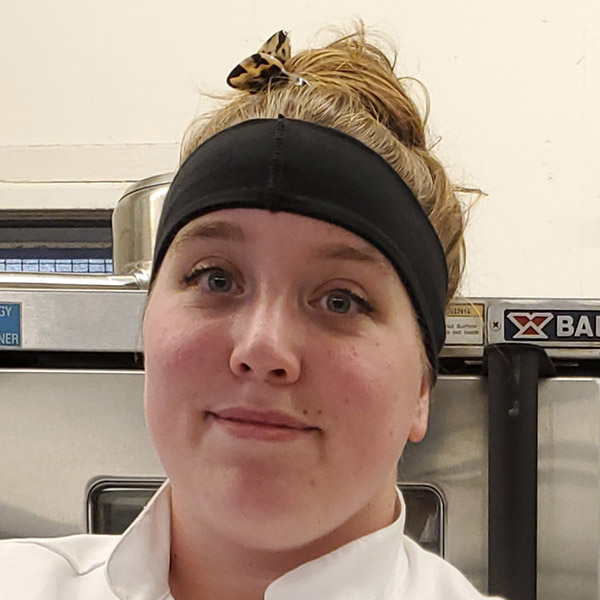
“The knowledge from Escoffier has given me the skills and confidence not only in my baking, but to take my baking and creations to the next level.”*
Trista Besecker, Online Pastry Arts Graduate
Program Highlights

HANDS-ON TRAINING

Entrepreneurial
Curriculum

CLASSIC &
CONTEMPORARY TECHNIQUES

PASTRY HANDS-ON INDUSTRY
EXTERNSHIPS

EXPERIENCED CHEF
EDUCATORS

CAREER PLANNING
AND PREPARATION

NATIONALLY ACCREDITED
Announcing: International Study Opportunities in France
Now Escoffier students can study at the renowned École Ducasse culinary institute in France and graduates can transfer credits towards a bachelor’s degree.
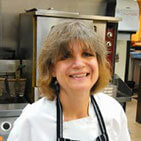
“The externship put me in a real-life situation and helped me further develop and hone skills that could really only happen on the job. As it turned out, one of my externship sites offered me a job, and I am now the pastry chef for a little café.”*
Jill Meredith, Baking and Pastry Arts Program
Tuition
TOTAL PROGRAM COST:
$32,445*
*The total program cost listed above encompasses tuition, tool kit, uniform, and an optional non-refundable technology fee if you do not already have a computer. As textbooks are delivered electronically, the cost of books used in the program and available online to the students are included in the tuition cost. For more cost details, refer to our catalog. This is the tuition when the Associates is taken fully online. When a student is enrolling into the Associates Degree program as a graduate from the online Professional Pastry Arts diploma, after qualified transfer credits, the remaining tuition is estimated based on the current rate at the time of transfer.
FINANCIAL AID IS AVAILABLE FOR THOSE WHO APPLY & QUALIFY.
School Code: 037763
A Typical Week at Escoffier
Approximately 15-23 hours per week is spent on school related activities depending on program, credential and personal pace.
The week runs from Wednesday to Tuesday with weekly due dates for student work.
Each week’s assignments will be broken into categories of learn, discuss and experience.
LEARN
Each week will begin with assigned reading via our online platform. Students will also watch the recorded chef demos for the week here.
DISCUSS
Students participate in discussion boards where the class responds to topics and questions the chef posts in regards to what you’re learning that week. There will also be live lessons held through a video platform each week. Live Sessions are your opportunity to interact with your chef and classmates. Students who attend or watch the archive generally perform better in school.
EXPERIENCE
This is where students turn their kitchen into their classroom lab, and cook! With all the prep work completed, students can now work through assignments by following our production sheet from start to finish, taking photos where instructed to.
How Chef Instructors Evaluate Student Dishes Online
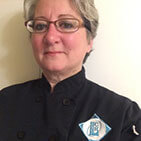
“The skills that are taught in the Escoffier Online program are not only beneficial to someone wanting to work in the industry, but anyone who loves to bake.”*
Sheri Gaskins, Baking and Pastry Arts Program
1Our Boulder, CO campus is the only accredited institution in the United States to offer both fully online diploma and degree programs with culinary classes and hands-on industry externships. We are accredited by ACCET – A Partnership for Quality®️. ACCET is listed by the U.S. Department of Education as a nationally recognized accrediting agency.
*This information may not reflect every student’s experience. Results and outcomes may be based on several factors such as geographical region or previous experience.
For more information about our completion rates and other important consumer information, please visit our website.
Read our privacy policy.
Copyright © 2025 Auguste Escoffier School of Culinary Arts. All rights reserved.
Auguste Escoffier School of Culinary Arts is a registered trademark of Triumph Higher Education Group. The Auguste Escoffier School of Culinary Arts Logo is a trademark of Triumph Higher Education Group.
